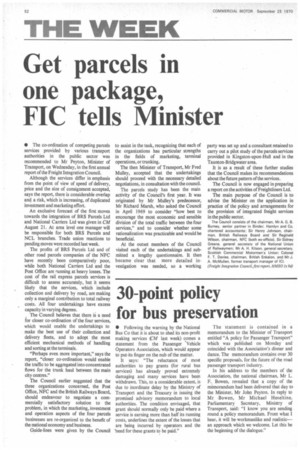Get parcels in one package, FIC tells Minister
Page 54

If you've noticed an error in this article please click here to report it so we can fix it.
• The co-ordination of competing parcels services provided by various transport authorities in the public sector was recommended to Mr Peyton, Minister of Transport, on Wednesday, in the first annual report of the Freight Integration Council.
Although the services differ in emphasis from the point of view of speed of delivery, price and the size of consignment accepted, says the report, there is considerable overlap and a risk, which is increasing, of duplicated investment and marketing effort.
An exclusive forecast of the first moves towards the integration of BRS Parcels Ltd and National Carriers Ltd was given in CM August 21. At area level one manager will be responsible for both BRS Parcels and NCL branches. Trade union reactions to pending moves were recorded last week.
The profits of BRS Parcels Ltd and of other road parcels companies of the NFC have recently been comparatively poor, while both National Carriers Ltd and the Post Office are running at heavy losses. The cost of the rail express parcels services is difficult to assess accurately, but it seems likely that the services, which include collection and delivery by road, are making only a marginal contribution to total railway costs. All four undertakings have excess capacity in varying degrees.
The Council believes that there is a need for closer co-ordination of the four services, which would enable the undertakings to make the best use of their collection and delivery fleets, and to adopt the most efficient mechanical methods of handling and sorting at the terminals.
"Perhaps even more important," says the report, "closer co-ordination would enable the traffic to be aggregated into concentrated flows for the trunk haul between the main city centres."
The Council earlier suggested that the three organizations concerned, the Post Office, NFC and the British Railways Board, should endeavour to negotiate a commercially satisfactory solution to the problem, in which the marketing, investment and operation aspects of the four parcels businesses are re-organized to the benefit of the national economy and business.
Guide-lines were given by the Council to assist in the task, recognizing that each of the organizations has particular strengths in the fields of marketing, terminal operations, or trunking.
The then Minister of Transport, Mr Fred Milky, accepted that the undertakings should proceed with the necessary detailed negotiations, in consultation with the council.
The parcels study has been the main activity of the Council's first year. It was originated by Mr Mulley's predecessor, Mr Richard Marsh, who asked the Council in April 1969 to consider "how best to encourage the most economic and sensible division of the total traffic between the four services," and to consider whether some rationalization was practicable and would be beneficial.
At the outset members of the Council visited each of the undertakings and submitted a lengthy questionnaire. It then became clear that more detailed investigation was needed, so a working party was set up and a consultant retained to carry out a pilot study of the parcels services provided in Kingston-upon-Hull and in the Taunton-Bridgwater area.
It is as a result of these further studies that the Council makes its recommendations about the future pattern of the services.
The Council is now engaged in preparing a report on the activities of Freightliners Ltd.
The main purpose of the Council is to advise the Minister on the application in practice of the policy and arrangements for the provision of integrated freight services in the public sector.
The Council consists of the chairman, Mr A. G. B. Burney, senior partner in Binder. Hamlyn and Co. chartered accountants: Sir Henry Johnson. chairman. British Railways Board and Sir Reginald Wilson, chairman. NFC iboth ex-officio), Sir Sidney Greene, general secretary of the National Union of Railwaymen; Mr A. H. Kitson, general secretary. Scottish Commercial Motormen's Union: Colonel F. T. Davies. chairman. British Enkalon. and Mr J. A. McMullen, former transport manager of ICI.
(Freight Integration Council,first report, HMSO is 9d)


























































































































































































